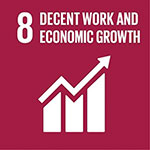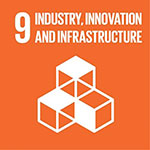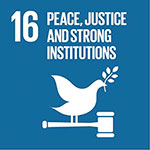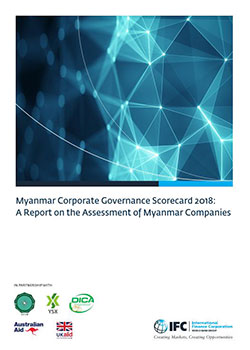Our current non-financial reporting provides our stakeholders with specific data points on these topics. To foster comparability, we use the following reporting standards: the Sustainable Development Goals (SDGs) and the GRI Standards as detailed below.
TMH endorses the following frameworks to structure its corporate reporting:
The table below highlights our priorities regarding the SDGs:
| SDG | Explanation | Results |
 |
We aim to create good careers opportunities for our people. We also believe TMH can play a critical role in developing the Myanmar economy. |
|
 |
Building infrastructures that will fuel and facilitate the operations of our tenants is our core business. In short, we contribute to connecting Myanmar to the world and digitalising our economy. |
|
 |
Building a sound and corruption-free society is key to fuelling Myanmar’s development. |
|
As a listed company, we must comply with various regulations related to corporate disclosure. For example, we strive to disclose all material information in a timely manner, through YSX’s website and our own to comply with Notification 1/2016 on Continuous Disclosure issued by SECM.
Since 2019, our website is regularly updated to facilitate access to relevant documents and data. TMH has also decided to keep investing in enhancing its corporate disclosure. We updated our mapping with the ASEAN Corporate Governance Scorecard. The document is available here.
Our corporate secretary is responsible for collecting all the necessary non-financial data and is also coordinating all our efforts on sustainability. We understand the main expectations of our stakeholders, as disclosed on our website. Therefore, the most materials topics are for TMH as follows:

Conducted regularly by the Myanmar Centre for Responsible Business and Yever , Pwint Thit Sa assesses the disclosure of Myanmar companies.
According to the last edition’s results, TMH improved its score from 54% in 2020 to 58%. With this score, TMH ranked 11th, and 2nd among listed companies.
The political crises impacted our operations. In collaboration with our clients, we assessed the risks related to security and safety.
Some of the sites are located in conflict areas. Ensuring the security of our employees can be highly complex. We work closely with our clients to assess the situation and decide if it is safe to operate and proceed. We also engage local communities; most of the sites’ guards are locally employed and can provide us with relevant information.
TMH relies on various suppliers and service providers to deliver projects to our clients.
Our procurement team is responsible for selecting relevant suppliers to ensure we can source all the right components on time and within budget. To ensure the quality of these suppliers’ work, our procurement team has defined a scorecard covering various dimensions, such as their ability to deliver on time, quantity, and quality. We also assess their quality of service. We monitor their overall performance at least twice per year. If areas of improvement are identified, we brief them.
To perform specific operations, we may need to engage with foreign suppliers. TMH is impacted on two fronts: first, we need up to 12 months to get all the necessary import licenses, and second, our ability to access foreign currency is minimal. This hinders our ability to deliver our projects on time, and we expect further deteriorations in the coming months.
To minimize these risks, we anticipate our procurement as much as possible and source and procure goods and services from Myanmar companies. In FY 23/24, 42% of our expenditure was on foreign suppliers, mainly from China.
As a telecom company, our direct environmental impacts are limited.
Regarding waste, our activities generated 50% less waste in FY23/24, with 119 kg of waste compared to 243 kg in FY22/23. We recycle 100% of our waste with a third party.
Our total energy consumption increased significantly to 30,021 MWh from 940 MWh in FY22/23, of which 96% is used when we refill the power generators while maintaining the telecom towers. As a result, our operations emitted 8,546 tonnes of carbon dioxide equivalent (CO2e) last year for our Scopes 1, 2 and 3. Scope 1 comprises the emissions of the assets we own and use to operate our activities. Scope 2 includes the electricity emissions consumed for our operations. Scope 3 consists of the indirect emissions from the assets that we do not own. 97% of our emissions are the consequences of diesel refills of the generators owned by our clients for the telecom towers we maintain.
More information can be found in our Annual report that can be downloaded here.
| KPIs | Unit | FY 23/24 | FY 22/23 | SDG | UNGC | GRI |
| BTS | ||||||
| Number of clients | Number | 1 | 2 | 8 | – | 102-6 |
| Number of BTS maintained by TMH | Number | 949 | 948 | 8 | – | 102-6 |
| Number of people connected to the mobile network | Number | 501,072 | 500,544 | 8 | – | 102-6 |
| Number of people connected to high-speed mobile network | Number | 142,350 | 142,200 | 8 | – | 102-6 |
| Number of performance issues/service disruptions | % | < 1% | < 1% | 8 | – | 102-6 |
| Customer satisfaction rate | % | > 99% | > 99% | 8 | – | 102-44 |
| Number of awards | Number | 3 | 4 | 8 | – | |
| Fibre | ||||||
| Number of clients | Number | 50,841 | 44,866 | 8 | – | 102-6 |
| Optical fibre installed | km | – | 103 | 8 | – | 102-6 |
| Data capacity | Gbps | 73 | 76 | 8 | – | 102-6 |
| Customer satisfaction rate | % | >93% | >95% | 8 | – | 102-44 |
| Mobile | ||||||
| Cards produced | Number | 7,682,600 | 14,765,500 | 8 | – | 102-6 |
| KPIs | Unit | FY 23/24 | FY 22/23 | SDG | UNGC | GRI |
| Compliance | ||||||
| Total number of ethics-related complaints/breaches | Number | 1 | 0 | 16 | 6, 10 | 205-3 |
| Transparency | ||||||
| Ranking in Pwint Thit Sa | Number | 11 | 9 | 16 | 10 | – |
| Board | ||||||
| Number of Directors certified by the MIOD | Number | 4 | 3 | 16 | 10 | – |
| Number of BOD Members trained | Number | 0 | 0 | 4, 8 | 6 | 404-2 |
| KPIs | Unit | FY 23/24 | FY 22/23 | SDG | UNGC | GRI |
| Headcount | ||||||
| Total number of people | Number | 250 | 273 | 8 | 6 | 102-7 |
| Number of female employees | Number | 73 | 76 | 5, 8 | 6 | 405-1 |
| Number of engineers/managers | Number | 120 | 142 | 5, 8 | 6 | 102-8 |
| – Number of females | Number | 20 | 19 | 5, 8 | 6 | 102-8 |
| – Number of males | Number | 100 | 123 | 5, 8 | 6 | 102-8 |
| Number of staff/supervisors | Number | 46 | 53 | 5, 8 | 6 | 102-8 |
| – Number of females | Number | 32 | 36 | 5, 8 | 6 | 102-8 |
| – Number of males | Number | 14 | 17 | 5, 8 | 6 | 102-8 |
| Number of workers/employees | Number | 80 | 74 | 5, 8 | 6 | 102-8 |
| – Number of females | Number | 21 | 15 | 5, 8 | 6 | 102-8 |
| – Number of males | Number | 59 | 59 | 5, 8 | 6 | 102-8 |
| Employee Engagement | ||||||
| Absenteeism rate | % | 1% | 1% | 8 | 6 | – |
| Turnover rate | % | 30% | 17% | 5, 8 | 6 | 401-1 |
| Average length of service | Years | 8.3 | 9.2 | 8 | 6 | 401-1 |
| Health and Safety | ||||||
| Number of accidents | Number | 1 | 2 | 8 | 6 | 403-9 |
| Frequency rate | Accident / million of working hours | 2.42 | 4.53 | 8 | 6 | 403-9 |
| Number of fatal accidents | Number | 0 | 0 | 8 | 6 | 403-9 |
| Fatality rate | Fatality / million of working hours | 0 | 0 | 8 | 6 | 403-9 |
| Training | ||||||
| Total number of training hours | Hours | 450 | 88 | 4, 8 | 6 | 404-1 |
| Total number of people who received at least one training | Number | 51 | 11 | 4, 8 | 6 | 404-2 |
| % of people trained | % | 20% | 4% | 4, 8 | 6 | 404-3 |
| Average hours of training per trainee | Hours | 2 | 0.3 | 4, 8 | 6 | 404-1 |
| Career Development | ||||||
| Total number of people hired | Number | 73 | 43 | 5, 8 | 6 | 401-1 |
| – Number of females | Number | 24 | 14 | 5, 8 | 6 | 401-1 |
| – Number of males | Number | 49 | 29 | 5, 8 | 6 | 401-1 |
| Total number of people promoted | Number | 15 | 1 | 5, 8 | 6 | 404-3 |
| KPIs | Unit | FY 23/24 | FY 22/23 | SDG | UNGC | GRI |
| Energy | ||||||
| Total electricity consumption | kWh | 30,021,197 | 940,631 | 12, 13 | 7, 8 | 302-1 |
| Carbon | ||||||
| Carbon emission | tonne CO2 eq. | 8,546,624 | 241 | 13 | 7, 8 | 305-2 |
| Water | ||||||
| Water consumed | m3 | 74.2 | 62.8 | 6 | 7, 8 | 303-1 |
| Waste | ||||||
| Waste produced | kg | 119 | 243 | 13 | 7, 8 | 306-2 |
| KPIs | Unit | FY 23/24 | FY 22/23 | SDG | UNGC | GRI |
| Tax | ||||||
| Total amount of tax contributed | million MMK | 399 | 246 | 16 | 207-4 | |
| Philanthropic Activities | ||||||
| Total amount of donation | million MMK | 1 | 2 | 9 | 203-1 | |